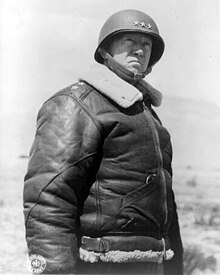
In early August 1943, Lieutenant General George S. Patton slapped two United States Army soldiers under his command during the Sicily Campaign of World War II. Patton's hard-driving personality and lack of belief in the medical condition of combat stress reaction, then known as "battle fatigue" or "shell shock", led to the soldiers' becoming the subject of his ire in incidents on August 3 and 10, when Patton struck and berated them after discovering they were patients at evacuation hospitals away from the front lines without apparent physical injuries.
Word of the incidents spread, eventually reaching Patton's superior, General Dwight D. Eisenhower, who ordered him to apologize to the men. Patton's actions were initially suppressed in the news until journalist Drew Pearson publicized them in the United States. The reactions of the U.S. Congress and the general public were divided between support and disdain for Patton's actions. Eisenhower and Army Chief of Staff George C. Marshall opted not to fire Patton as a commander.
Seizing the opportunity the predicament presented, Eisenhower used Patton as a decoy in Operation Fortitude, sending faulty intelligence to German agents that Patton was leading Operation Overlord, the Allied invasion of Europe. While Patton eventually returned to combat command in the European Theater in mid-1944, the slapping incidents were seen by Eisenhower, Marshall, and other leaders to be examples of Patton's brashness and impulsivity.